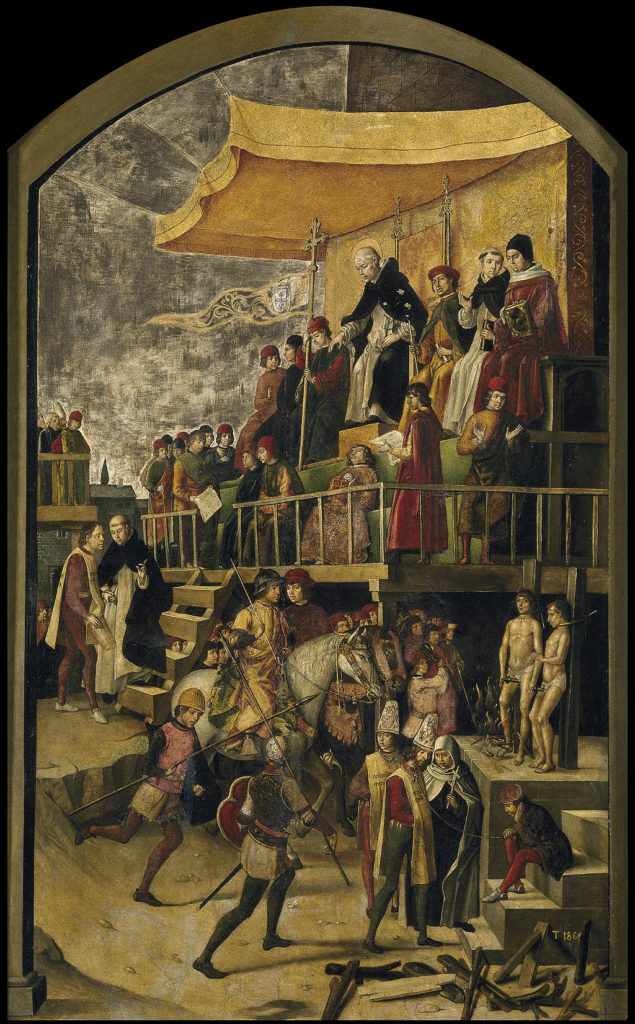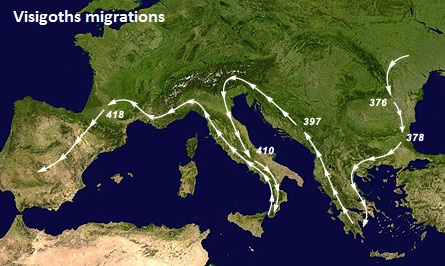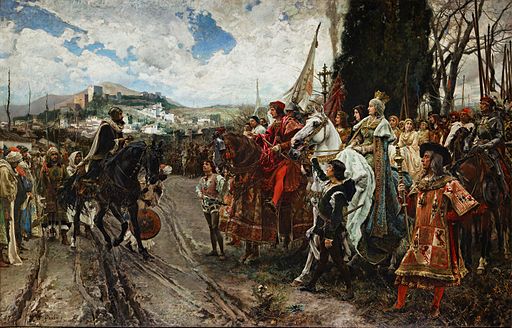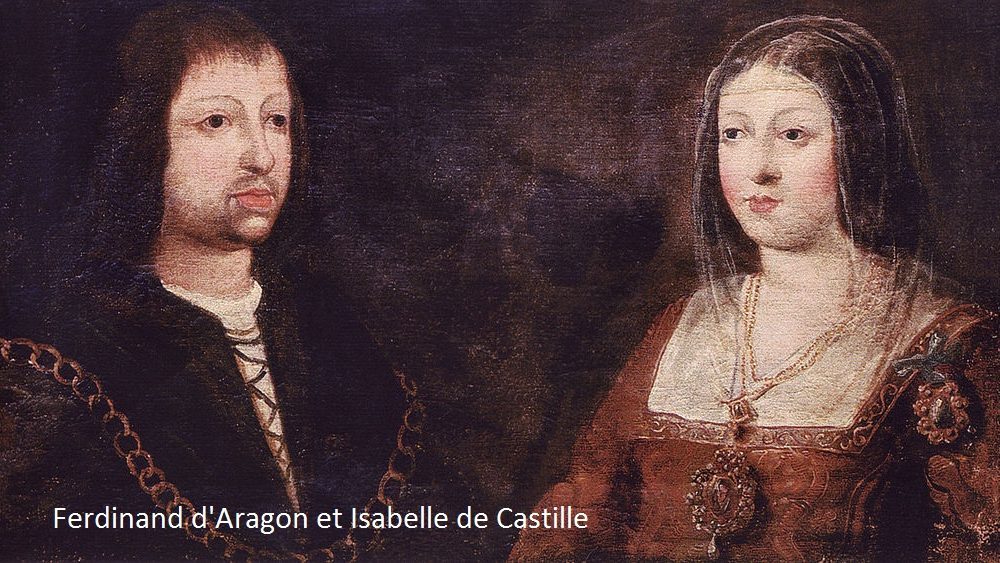
1470 AD to 1490 AD, Psalm 120: The Inquisition.
This site was first built in French (see www.147thgeneration.net). The English translation was mainly done using « google translation ». We have tried to correct the result of this translation to avoid interpretation errors. However, it is likely that there are unsatisfactory translations, do not hesitate to communicate them to us for correction.
(for that click on this paragraph)
Summary
This generation of the 1470s and 1480s.
According to our count, this generation is the 120th generation associated with Psalm 120. It is in this Psalm 120 that we therefore find an illustration of the facts of this generation.
In Spain since the massive conversion movements orchestrated since the end of the 14th century, the conversos by their ambiguous status have managed to integrate into Spanish high society. This does not fail to create certain enmities. For nearly forty years, initiatives against or in favor of the Jews and the conversos followed one another. This both from the side of the clergy and of power in Spain, without either side winning.
In 1469, the marriage between Ferdinand of Aragon and Isabella of Castile aroused optimism among Jews and conversos. In fact, this marriage between the kingdoms of Castile and Aragon heralds the end of the Jewish presence in Spain. Quite quickly, the situation deteriorates for both Jews and conversos. The inquisition settles permanently in Spain on the Iberian Peninsula.
In fact, from the start of the next generation, the fate of the Jews in the Iberian Peninsula will be definitively sealed. Yet the Jews were in Spain even before the Roman Empire became Christian.
For many centuries, the Jews thought they could live together in Spain with Christians and Muslims, Christians who claim to be heirs of the Visigoths, Muslims descendants of the Umayyads. As the psalm of this generation finds, this hope has been in vain.
For Muslims too it is the end of the Spanish adventure. In this generation, the last Muslim kingdom in the land of Spain is the Nasrid kingdom of Granada. As Isaiah’s prophecies announce, there is exactly one year left to survive after this generation. He will effectively disappear on January 1, 1492.
Talk
The marriage between Ferdinand of Aragon and Isabella of Castile
The previous (double) generation has allowed the Jews of Spain to reorganize themselves from a religious point of view, which will preserve them as a Jewish people outside the borders of Spain when it will soon be abandoned.
It is therefore first of all on this positive observation that the psalm of this generation begins:

- A song of ascents. In my distress I called to the Lord, and He answered me.
However past distress does not preserve the coming one. In Spain, since the massive conversion movements orchestrated since the end of the 14th century, conversos by their ambiguous status have become part of the high Spanish society without failing to create certain enmities.
For nearly forty years, initiatives against or in favor of the Jews and conversos succeeded one another as much on the side of the clergy as on the power in Spain, without any of the camps prevailing. But at the dawn of the present generation, the threat is becoming clearer for the Jews and the conversos of Spain, even if it is not yet really perceptible to those concerned:
- A turning point [1], invisible but crucial, was taken in 1469, against the will of Henry I: under the auspices of Jewish financier Abraham Senior (influential man at the Spanish court). The marriage between Ferdinand of Aragon and Isabella of Castile was celebrated, which gave rise to optimism among Jews and conversos. A strong monarchy could and should better resist the claims of the church, guarantee a better autonomy. And then Ferdinand and Isabella were known for their friendships with important members of the finance and the Marranos and Jewish intelligentsia. Illusory hopes.
Indeed this marriage between the kingdoms of Castile and Aragon spell the end of the Jewish presence in Spain.
The fate is sealed for the Jews of Spain
Thus, rather quickly, the situation deteriorates as well for the Jews as the conversos. The inquisition settles permanently in Spain in the Iberian Peninsula. After several centuries of presence, including many happy years, Spanish Judaism is dying, at least in the land of Spain.
The inquisition that begins its establishment in Spain augurs the imminent end of the Jewish presence in Spain.
Diatribes (« deceitful tongue ») against the Jews accumulated for generations on Christian soil finally reached their goal: to remove Judaism from Catholic lands. And with them, Jews faithful to their religion or those who thought they could pretend to abandon it. These are sent to the stake (« coals of brooms »).
This is what the following psalm of this generation translates:

- O Lord, save my soul from false lips, from a deceitful tongue.
- What can He give you, and what can He add to you, you deceitful tongue?
- Sharpened arrows of a mighty man with coals of brooms.
In fact, from the beginning of the next generation the fate of the Jews in the Iberian Peninsula will be definitively sealed and it will be the end of this long period of more than a millennium when the Jews could believe in a peaceful cohabitation with Christians. and Muslims.
The Jews were in the land of Spain, presumably before the Roman Empire became Christian.
What a pity to have stayed at Meshech
A difficult first period was crossed when the Visigoths converted to Catholicism (at first they were followers of a variant of Arianism that did not recognize the dogma of the Trinity advocated by the official religion of Constantinople). The Jews of Spain were then able to survive on the one hand simulating a facade conversion and on the other hand by the establishment of Omeyyade power.
During the phase of Muslim extremism represented by the coming to power of the Almohads, the Jews could still survive by simulating once again a facade conversion, this time a simulated conversion to Islam.
For some generations, in the face of the new Christian threat, it was natural that many Jews thought they could survive the new Christian extremism by again simulating, for many converts, a Christianity facade. Unfortunately, after a few generations, the storm not only has not passed but it is intensifying trapping both those who have chosen to convert in appearance as well as those who remain in Judaism trying to keep in touch with their Marranos brothers.
Even those who have converted sincerely will be worried.
Not only is anti-Judaism not weakening, but it is intensifying by identifying the Spanish people with the Visigoth people. But this Visigothic people had a long journey before settling in Spain, especially in Roman times, it was established near the Black Sea.
‘Meshech’ is [2] one of the seven sons of Japhet, associated with peoples of Asia Minor. Probably Phrygia and Cilicia, or people from the shores of the Black Sea. The Visigoth people can therefore be metaphorically associated with ‘Meshech‘.
This is what the psalmist does in the following of this generation’s psalm:

- Woe is to me for I have sojourned in Meshech; …
By associating Meshech with the Visigoths and therefore with Christian Spain, the psalmist allows us to refer to the predictions of Ezekiel, which summarize well the designs of the heirs (at least on the religious point) of the Visigoths in Spain towards the people of Israel:
- Then the word [3] of the Lord came to me, saying:
- « Son of man, set your face toward Gog, [toward] the land of Magog, the prince, the head of Meshech and Tubal, and prophesy concerning him.
- And you shall say; So said the Lord God: Behold, I am against you, Gog, the prince, the head of Meshech and Tubal.
- (…)
- From many days you will be remembered; at the end of the years you will come to a land [whose inhabitants] returned from the sword, gathered from many peoples, upon the mountains of Israel, which had been continually laid waste, but it was liberated from the nations, and they all dwelt securely.
- And you will ascend; like mist you will come; like a cloud to cover the earth you will be; you and all your wings and many peoples with you.
- So said the Lord God: It will come to pass on that day that words will enter your heart and you will think a thought of evil.
- And you will say, « I shall ascend upon a land of open cities; I shall come upon the tranquil, who dwell securely; all of them living without a wall, and they have no bars or doors.
- To take spoil and to plunder loot, to return your hand upon the resettled ruins and to a people gathered from nations, acquiring livestock and possessions, dwelling on the navel of the earth.
The tents of Kedar
To the fate of the Visigoths, was associated that of the Umayyads, dynasty that ruled over Islam in the Middle East for many generations. The Umayyads designated Damascus as the capital, and like the Visigoths who appropriated Temple items, they appropriated the site of the Temple by building the mosque known as Al Aqsa while hardening the lives of Jews in Palestine. by a hard application of the laws of Omar, of which the Umayyads are perhaps the real initiators.
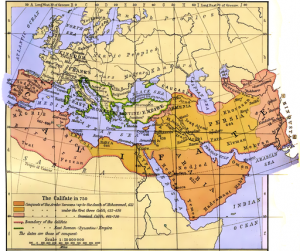
The Umayyad dynasty that had established its capital in Syria, Damascus was strongly established in Palestine (on both sides of the Jordan) like the city of al Ramla (40 km north-west of Jerusalem), only Arab-Muslim city of importance founded in the land of Israel, which will later serve as Caliph residence to the Umayyads.
It is one of the descendants and only survivor of this dynasty, which founded the Umayyad dynasty of Cordova, a source of harmonious cohabitation between the three monotheistic religions in the land of Spain for many generations.
Thus the association between this dynasty established in Spain and Kedar [4] which means « swarthy » is that one of the twelve sons of Ishmael associated with a nomadic Arab tribe of Transjordan is widely appropriate and allows to better understand the continuation of the psalm of this generation:

- (Woe is to me for) … I dwelt among the tents of Kedar.
The Nasrid Kingdom of Granada
Unfortunately, as for the Jews of the Iberian Peninsula, this generation is the last to see a Muslim power still established in Spain. There remains only one year to survive this generation, which ends in 1490, in the Nasrid kingdom of Granada, the last Muslim kingdom in the land of Spain:
- When [5] opened the year 1492, Aragon and Castile, respectively reigning Ferdinand and Isabella, were still engaged in a war that began ten years earlier, in November 1481, on the border between Castile of the Kingdom of Granada, the small Muslim state in the hands of the Nasrid dynasty. […] In 1491, the Christian rulers laid siege to Granada, the capital of Nasrid that had settled there since the 13th century, and for this purpose settled in Santa Fe, a small town built for the occasion about ten kilometers away. Granada, unable to refuel, was asphyxiated.
- The Emir Abu Abd Allah, al-Zughbi negotiated with Ferdinand and Isabella the conditions of the surrender of the city of Alhambra. By virtue of capitulations signed on the 25th of November, the safety of the Grenadines and their property was assured (the emir of Granada included the Jewish community of the city), and the freedom of worship guaranteed. The Emir undertook in exchange to deliver his capital within sixty days. On the night of January 1 to 2, 1492, guided by the representatives of the Emir, the Christian vanguard occupied the fortress and the other strong points of the city. A cross and the banners of the Christian rulers were erected at the top of the hill while Boabdil (nickname of the emir) went away forever.
This event, which initiates the year 1492, confirms Isaiah’s preaching associated with Kedar that the psalmist makes possible to connect with the Muslim presence in the land of Spain. Isaiah actually predicts that Kedar, the Muslim presence in Spain will survive one year at the end of this generation:
- For so [6] has the Lord said to me: « In another year, like the days of a hireling, all the glory of Kedar shall terminate.
- And the rest of the number of the bows of the heroes of the children of Kedar shall decrease, for the Lord, the God of Israel has spoken. »
This announced end of a harmonious cohabitation between the three religions in the Iberian Peninsula is the subject of the conclusion of the psalm of this generation:

- For a long time, my soul dwelt with those who hate peace.
- I am at peace, but when I speak, they [come] to [wage] war.

[1] Riccardo Calimani: « The Jewish wandering ». Chapter: « Discrimination, Persecution, Survival ». (French: « L’errance juive ». Chapitre : « La discrimination, la persécution, la survie ». (p. 217) ).
[2] According to O. Odelain and R. Séguineau: « Dictionary of the proper names of the Bible ». (Entries: Meshek and Tubal) (French: « Dictionnaire des noms propres de la Bible ». (Entrée : Méshek, p. 253 et Tubal, p. 380) )
[3] Yechezkel – Ezekiel – Chapter 38, verses 1 to 3 and 8 to 12.
[4] According to O. Odelain and R. Séguineau: « Dictionary of the proper names of the Bible ». (Entry: Qédar) (French: « Dictionnaire des noms propres de la Bible ». (entrée : Qédar, p. 306) )
[5] (supervised by) Patrick Boucheron: « History of the world in the fifteenth century ». Chapter of Bernard Vincent: « 1492: the year of the world ». (French: « Histoire du monde au XVe siècle ». Chapitre de Bernard Vincent: « 1492 : l’année du monde ». (p. 408-409) ).
[6] Yeshayahu – Isaiah – Chapter 21, verses 16 and 17.

